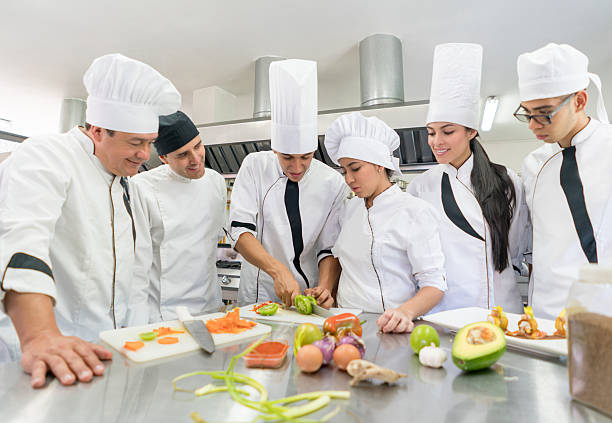Madurai, often referred to as the cultural capital of Tamil Nadu, is not only famous for its rich history and stunning temples but also for its vibrant educational landscape, particularly in the field of hospitality and culinary arts. Among the various disciplines that attract students from all over India and beyond, the Bachelor of Science (BSc) in Catering and Hotel Management is a standout choice. This program is meticulously designed to cater to the booming hospitality industry, preparing students for diverse opportunities in hotel management, catering, and food & beverage sectors.
BSc Catering Colleges in Madurai
Why Choose Anna College Madurai for BSc Catering?
Choosing Anna College in Madurai for a BSc in Catering offers several compelling advantages:
- Industry-Relevant Curriculum: The program is designed to meet the demands of the hospitality sector, ensuring that students are well-prepared with the necessary skills and knowledge.
- Practical Exposure: Students benefit from hands-on training in well-equipped facilities, along with internships and real-world experience in the bustling hospitality environment of Madurai.
- Experienced Faculty: The college boasts a team of experienced and dedicated instructors who bring valuable industry insights and mentorship to the classroom.
- Job Opportunities: Madurai’s thriving tourism and hospitality industry offers numerous career opportunities for graduates, making the location an ideal choice for networking and employment.
- Affordable Education: Compared to many institutions offering similar courses, Anna College provides a more affordable option without compromising on the quality of education and training.
Overall, Anna College Madurai stands out as a practical, career-oriented choice for students aiming to succeed in the hospitality and catering industry.

Experienced faculty
The value of experienced faculty in a BSc Catering program, like the one at Anna College in Madurai, cannot be overstated. These professionals bring a wealth of knowledge and insights directly from the hospitality and catering industry, which is crucial for several reasons:
- Industry Expertise: Experienced instructors have typically spent considerable time working in various sectors of the hospitality industry. They bring this practical knowledge into the classroom, providing students with a realistic view of the industry’s challenges and expectations.
- Mentorship: Faculty with real-world experience are invaluable mentors. They can guide students not just academically but also in making career decisions, leveraging their own networks and industry contacts to help students gain employment or further educational opportunities.
- Updated Curriculum: Instructors who are actively involved or closely connected with the industry help ensure that the curriculum remains relevant to current industry standards and practices. This dynamic approach to teaching ensures that students learn techniques and concepts that are current and in demand.
- Innovation and Creativity: Experienced educators often bring new ideas and innovations from the industry to the classroom. This can inspire creativity in students, encouraging them to think outside the box and develop new solutions or ideas that could benefit their future careers.
- Professional Development: Through interactions with experienced faculty, students can learn not only about the technical aspects of catering and hospitality but also about professionalism, work ethic, and the soft skills that are crucial for success in any career.
By learning from instructors who have firsthand experience and active connections in the hospitality industry, students at Anna College can expect a robust educational experience that prepares them thoroughly for successful careers in catering and beyond.
Sustainability Practices in Catering
Sustainability in the hospitality industry has transitioned from a niche advantage to a critical necessity. With consumers increasingly valuing environmental stewardship, the industry is under growing pressure to adopt sustainable practices. This shift affects everything from sourcing ingredients and minimizing waste to energy-efficient operations and sustainable building materials. Catering colleges such as Anna College in Madurai play a pivotal role in embedding these values into the next generation of hospitality professionals.
Through partnerships with eco-conscious industry leaders, the college integrates sustainability into its curriculum and practical training. These collaborations enable students to learn about innovative, sustainable practices directly from pioneers in the field. For instance, students might engage in workshops or projects focusing on reducing food waste, using local and seasonal produce, or implementing water-saving techniques in food preparation and facility operations.
Global Internship Opportunities
In the increasingly interconnected world of hospitality, gaining international experience is invaluable. Anna College in Madurai understands this and strives to offer global internship opportunities through its international hospitality partnerships. These opportunities allow students to immerse themselves in diverse cultural and operational environments, enhancing their understanding of global hospitality standards and practices.
International internships are facilitated through agreements with hotels, resorts, and other hospitality entities across the globe. These can range from short-term summer internships to semester-long programs. They provide students with a platform to apply their theoretical knowledge in international settings, confront new challenges, and develop a broader perspective on the hospitality industry.
Role of Alumni in Industry Connections
Alumni play a pivotal role in strengthening the bridge between academic preparation and professional success, particularly in specialized fields like catering and hospitality. At Anna College in Madurai, the alumni network is a vital resource, actively involved in facilitating industry connections that lead to tangible opportunities for current students.
Many alumni, who have carved successful paths in various segments of the hospitality industry, frequently return to the college to share their experiences and insights. These interactions can take the form of guest lectures, mentorship sessions, and informal talks, providing students with real-world perspectives and advice on navigating their careers. More tangibly, alumni often recommend or facilitate internships and job placements within their organizations or the wider network they belong to, acting as invaluable career catalysts.
Collaborative Projects and Competitions
Collaborative projects and competitions are integral to the curriculum at Anna College, providing students with platforms to apply their theoretical knowledge in practical, often high-stakes environments. These initiatives are frequently sponsored by industry leaders looking to foster new talent and inject innovative ideas into their operations.
For example, students might participate in competitions to create sustainable menu designs for luxury resorts or design cost-efficient yet effective hospitality services for boutique hotels. Such competitions not only sharpen the students’ practical skills but also promote creative thinking and innovation in addressing real-world challenges in the hospitality industry.
Industry Partnerships and Placements
Industry partnerships and placements are pivotal components of a robust educational program, especially in fields like catering and hospitality management. At institutions like Anna College in Madurai, these collaborations are instrumental for several key reasons:
- Practical Experience: Partnerships with leading hotels, resorts, and restaurants provide students with essential hands-on training. This experience is invaluable as students get to apply theoretical knowledge in real-world settings, dealing with actual customers and industry-specific challenges.
- Networking Opportunities: Engaging with industry partners opens up numerous networking opportunities for students. These connections can lead to job offers and valuable professional relationships that can assist throughout their careers.
- Enhanced Employment Prospects: Many institutions have tie-ups that include direct placements or internship opportunities. These arrangements often give students a competitive edge in the job market, as many companies prefer to hire from within their pool of interns who have already demonstrated their capabilities.
- Industry Insights and Trends: Regular interaction with industry partners ensures that students and faculty stay updated with the latest trends, technologies, and practices in the hospitality sector. This dynamic learning environment helps students adapt more quickly to changes in the industry once they graduate.
- Curriculum Development: Feedback from industry partners can also play a crucial role in shaping the curriculum. They can provide insights into the skills and knowledge that are most sought after in the industry, ensuring that the educational program meets market demands.
At Anna College, the focus on establishing strong industry partnerships and facilitating meaningful placement opportunities is designed to enhance the educational experience and increase the career readiness of its graduates. This strategy not only benefits the students but also serves the needs of the industry, creating a beneficial ecosystem for both parties.
Conclusion
Anna College Madurai is an excellent choice for students aspiring to pursue a BSc Catering Colleges in Madurai. With its quality education, experienced faculty, modern infrastructure, industry partnerships, and placement support, the college provides a strong foundation for a successful career in the catering and hospitality industry.
Frequently Asked Questions
1. What is BSc catering Science and Hotel Management?
BSc catering Science and Hotel Management is an undergraduate degree program that focuses on the study of catering science and various aspects of hotel management. It equips students with the necessary skills and knowledge required to pursue a career in the hospitality industry.
2. What is the full form of BSc in Hotel Management?
The full form of BSc in Hotel Management is Bachelor of Science in Hotel Management.
3. What is meant by catering Science?
Catering Science refers to the study of the principles, practices, and techniques involved in the preparation, presentation, and service of food and beverages in the hospitality industry. It encompasses various aspects such as menu planning, food production, food safety, nutrition, and customer service.
4. How many catering colleges are there in Chennai?
The exact number of catering colleges in Chennai may vary, but there are several renowned institutions offering courses in catering and hotel management in the city.
5. What is the highest salary of BSc Hotel Management?
The highest salary of a BSc Hotel Management graduate can vary depending on factors such as experience, job role, and the employer. However, experienced professionals in top managerial positions in the hotel industry can earn lucrative salaries.
6. Which is better, BSc or Hotel Management?
BSc and Hotel Management are different aspects of education. BSc is a broader science degree that covers various subjects, whereas Hotel Management is a specialized program focusing on the hospitality industry. The choice between the two depends on individual interests and career goals.
7. What is the salary of a hotel manager with a BSc in India?
The salary of a hotel manager with a BSc in India can vary depending on factors such as the size and reputation of the hotel, the location, the manager’s experience, and skills. On average, hotel managers in India can earn a decent salary, which may range from ₹4 lakh to ₹10 lakh per annum.
8. Which course is best for hotel management after 12th?
There are various courses available for hotel management after 12th, including Bachelor of Hotel Management (BHM), BSc in Hotel Management, Diploma in Hotel Management, and Bachelor of Arts in Culinary Arts, among others. The best course depends on one’s interests, career aspirations, and personal circumstances.
9. Is BSc Hotel Management easy or hard?
The difficulty level of BSc Hotel Management can vary from person to person. It requires a combination of theoretical knowledge, practical skills, and interpersonal abilities. Students who are passionate about the hospitality industry and have a genuine interest in the subject matter may find it more manageable.
10. What are the three types of catering?
The three types of catering are:
On-Premise Catering: This refers to catering services provided at the same location where the food is prepared, such as restaurants, hotels, and banquet halls.
Off-Premise Catering: It involves providing catering services at a location separate from where the food is prepared, such as outdoor events, parties, and weddings.
Mobile Catering: This type of catering involves serving food from a movable vehicle, such as food trucks or mobile food carts, at different locations or events.

